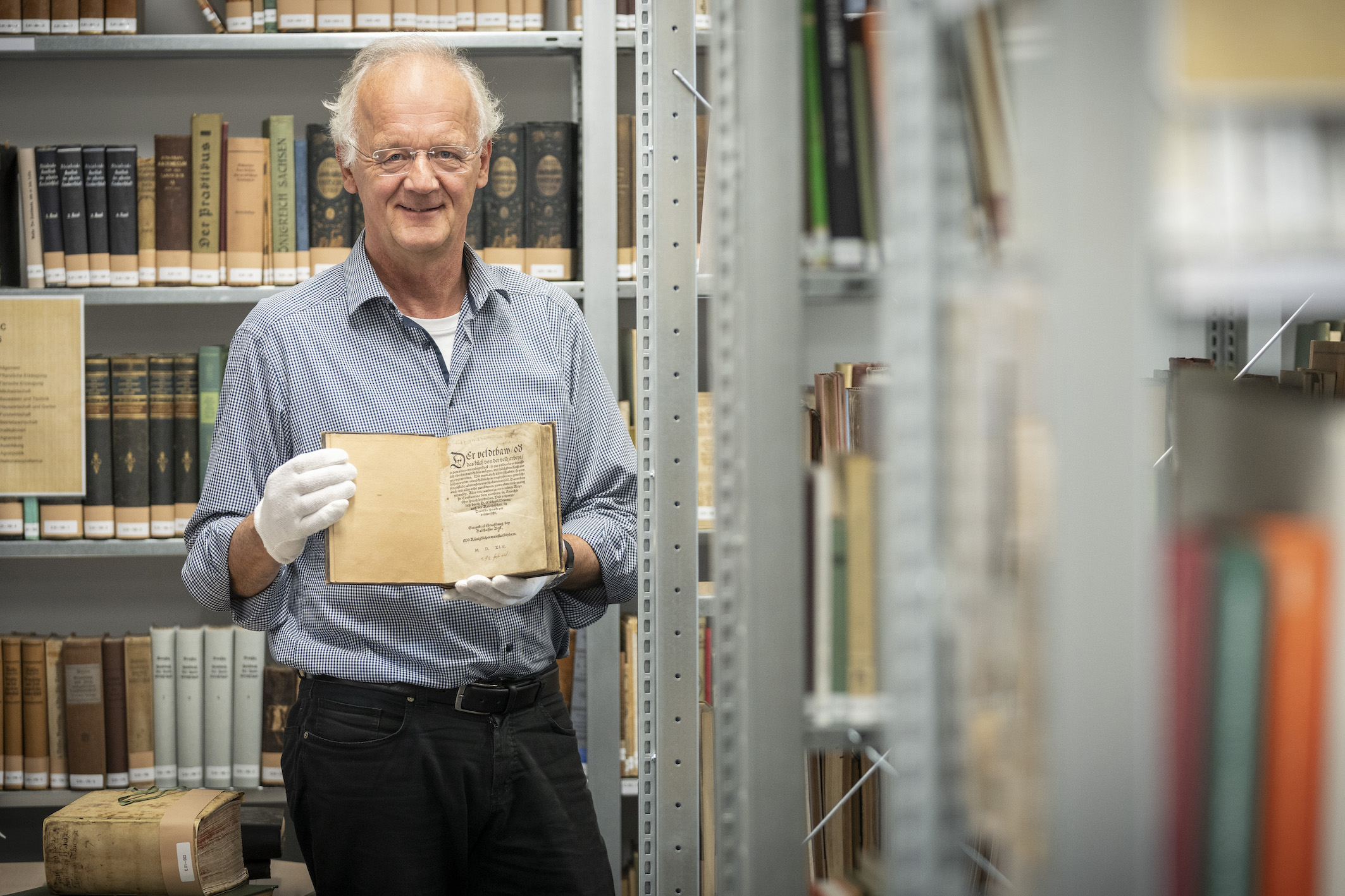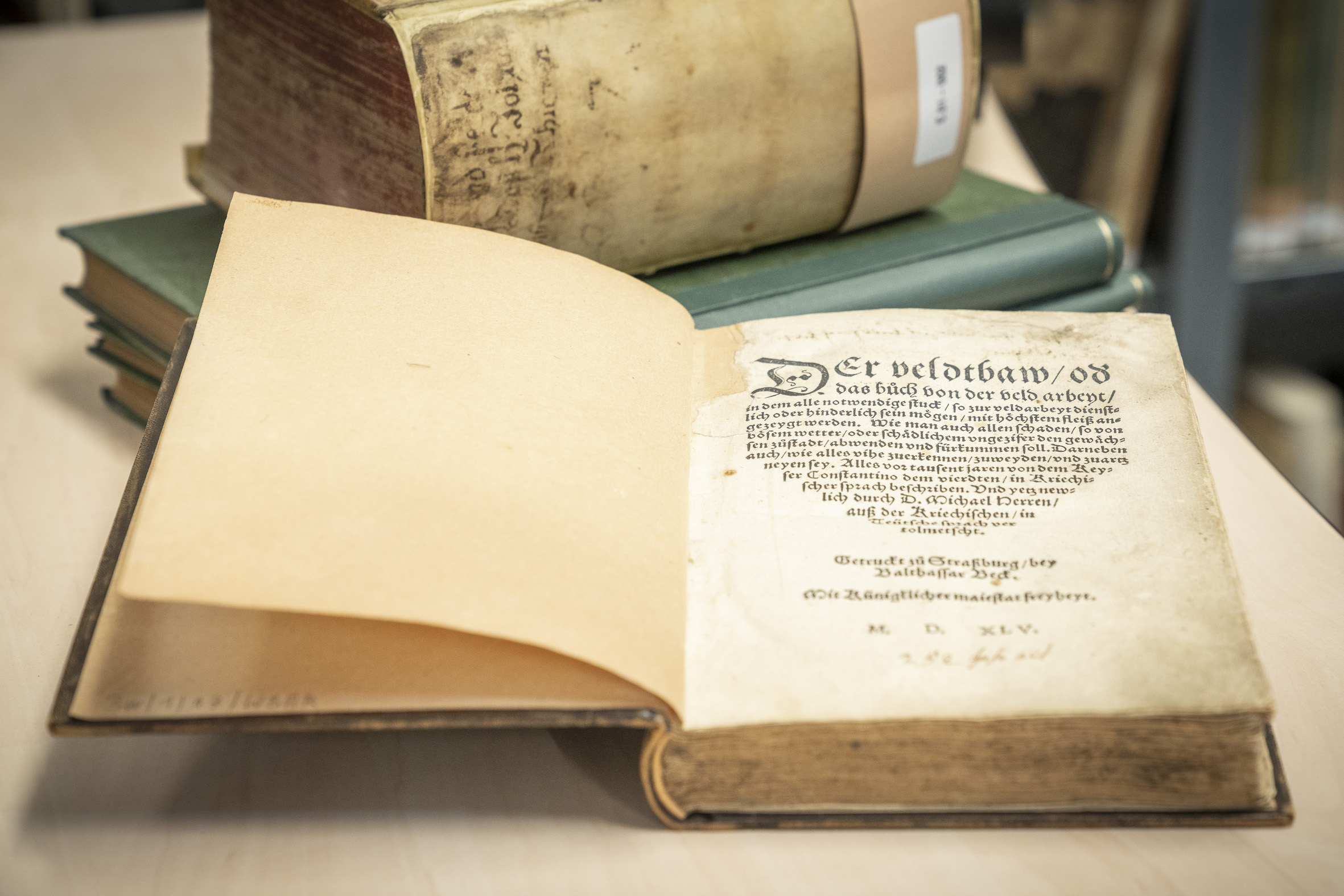31.08.2023
WESTPHALIAN LIBRARY OF AGRICULTURE

Contact person
Gabriele Blömker
02501 801-1670
gabriele.bloemker@lv.de

Gisbert Strotdrees with the book „Der Feldbau“, the oldest book in the Westphalian Library of Agriculture from 1545

Title of the oldest book in the library - in the 16th century spelling: „Der Veldtbaw oder das Buoch von der veld arbeyt“ („The Field Construction - or: The Book of Field Work“).

The „Haus-, Feld-, Artzney-, Koch-, Kunst und Wunderbuch“ from 1683 is a 1,600-page textbook and guidebook on agriculture, forestry and home economics of the 17th century - a kind of „analogue Wikipedia“ with numerous illustrations.
Digital inventory completed – 6.500 volumes in stock - oldest book 478 years old
The digital re-inventory of the Westphalian Library of Agriculture (WBL), which was launched last year, has been completed. The 6.500-volume collection of practice-oriented agricultural literature from the past five centuries is spatially concentrated in Westphalia-Lippe and north-west Germany. It is owned by the Stiftung Landwirtschaftsverlag in Münster.
Many items in the collection are rare and valuable, some are even unique and have not yet been recorded in any library catalogue. „Our oldest book 'Der Feldbau' is 478 years old,“ emphasises Gisbert Strotdrees, head of the WBL and editor at Wochenblatt für Landwirtschaft und Landleben. „It was printed in Strasbourg in 1545. In it, the author Michael Herr, a scholar and agricultural expert of the Reformation period, compiled the knowledge of his time and wrote a kind of guidebook,“ says the studied historian, describing the book's objective. On 160 pages, the author has answered questions that are just as relevant today as they were then: How do you make cheese? How do you make sure that swarms of bees don't fly away forever? How do you treat a sick pig? How do you predict the weather for the next day?
Another rarity dates from the Baroque period and is entitled „Haus-, Feld-, Artzney-, Koch-, Kunst und Wunderbuch“. „This book of instruction and advice was printed in Nuremberg in 1683 and comprises around 1,600 pages - it is something like an analogue Wikipedia of 17th century agriculture, forestry and home economics,“ says Strotdrees, describing the significance of the 340-year-old work.
„Among the most unusual titles in our collection is 'Dr Lampe's Bienenzucht' from 1899, which contains, among other things, large fold-out graphics that let you look inside a queen bee or a drone,“ says the WBL director. This is pop-up book art at its best, but designed more than 120 years ago.
Other rarities in the library include
- one of the oldest textbooks on horse husbandry and horsemanship, written in 1774 by the Lippe court riding master Johann Gottfried Prizelius,
- a „Manual for the Cultivation of Maize“ from 1850,
- a sales catalogue of the oldest agricultural machinery factory in Germany in Stuttgart-Hohenheim from 1854 and
- the complete first volume of 1844 of the ‚Landwirthschaftliche Zeitung‘. It is the predecessor of today's Wochenblatt für Landwirtschaft und Landleben, which is thus currently in its 179th year. Today, only six complete copies of the first volume of 1844 can be found anywhere in the world.
The Westphalian Agricultural Library is part of the Stiftung Landwirtschaftsverlag and is organised as a reference library. People interested in agricultural history can search the stock digitally (WBL stock) and use the books on site after registering. „Feel free to browse the digital holdings lists and drop in if you have found something of interest. We welcome every visitor who shares our interest and passion for the agricultural history of our home region,“ says Strotdrees.
In the next stage of development, the WBL will consistently network with other agricultural history institutions. These include, for example, the ‚Agrarhistorische Bibliothek‘ in Herrsching am Ammersee and the ‚Gesellschaft für Agrargeschichte‘ in Frankfurt, which will hold its next annual conference on 27 and 28 June 2024 at the Landwirtschaftsverlag in Münster.
Contact for your queries:
Gisbert Strotdrees
Stiftung Landwirtschaftsverlag Münster
Hülsebrockstr. 2–8, 48165 Münster
Tel.:+49 (0) 25 01 801-8310
stiftung@lv.de
https://www.stiftung-lv-muenster.de/bibliothek.php